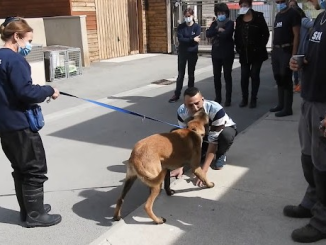
Mexico City’s Museo Tamayo has put together a modern art exhibition for the enjoyment of humans and their furry friends.
Artists have always been inspired by the bond between humans and their canine companions.
Now, one Mexican museum wants to bring the art world to dogs themselves.
Mexico City’s Museo Tamayo has put together a modern art exhibition for the enjoyment of humans and their furry friends.
Lorenza Errasti, curatorial assistant for the museum’s collection, said the exhibition is a selection of works from the museum’s collection and was intended for the enjoyment of owners and their dogs alike.

“The readings of the exhibition are based on emotions,” according to Errasti. “And the affectionate relationship that exists between an owner and their dog is always there, and even more so now that we open this space for that.”
The exhibition, #ArteyPerros (“Art and Dogs”) includes pieces by Haris Epaminonda, Max Ernst, Mathias Goeritz, Pierre Huyghe, Danh Vo and Mario Garcia Torres as well as a poem by Luis Felipe Fabre. It is the exhibition’s second instalment, with the first held in 2020.

The response to the initiative so far has been positive, as many people enjoyed the chance to appreciate the artwork along with their furry friends.
“I like to take my dog everywhere,” said Mila Cohen, a sixth-grade student, near a Max Ernst painting.
“It would be incredible if there were more spaces like this, with art, where we could spend time with our dogs,” noted Manu Echeverria, a photographer.
Man rescues 31 dogs from slaughterhouse in south-central Vietnam

A man from Khanh Hoa Province, south-central Vietnam spent VND24 million (US$1,027) rescuing 31 dogs from a slaughterhouse and is now looking for their owners.
The man, 46-year-old Do Minh Khoi from Nha Trang City, which is the provincial capital, shared the story to his Facebook page on Wednesday.
According to Khoi’s account, his two dogs were stolen while he was on a business trip in Hanoi, prompting him and his son to scour dozens of slaughterhouses between Nha Trang City and Dien Khanh District, also in Khanh Hoa Province, to find their beloved pets.
On Wednesday morning, Khoi arrived at a facility in Dien Khanh and saw dozens of dogs locked in cages, ready to be slaughtered.
He wound up buying all of them from the abattoir in order to save them.

“Many of the dogs were exhausted and lying still, while some were sticking their paws out as if they were asking me to save them,” Khoi recalled.
The man said he paid a total of VND20 million ($856) to buy the dogs and another VND4 million ($171) to transport them to his home in Nha Trang.
Khoi later posted the story on Facebook in the hope of finding each dog’s owner.
As of Thursday, two people had been reunited with their pets thanks to Khoi.
“Seeing the dogs wagging their tails when they saw their owners made me really happy,” Khoi said.
Ha Thuy Tram, 28, from Khanh Hoa’s Cam Lam District, said she lost her dog several days earlier.

Tram’s family had raised the dog for two years before it was stolen. They searched several dog meat shops and slaughterhouses in the locality after the canine disappeared.
“I discovered that my dog had been rescued after seeing Khoi’s status on Facebook, so I decided to travel all the way to Nha Trang to get my pet,” Tram said.
“I wanted to give Khoi some money to thank him for saving my dog, but he refused it.”
Khoi plans to keep the rescued canines at his home for about seven days so that their owners can come and take them home, afterward he will take the remaining dogs to a local animal rescue shelter.
“People who wish to find their lost dogs can come to my house at 30D Dong Nai Street in Phuoc Hai Ward, Nha Trang City, or call 0909473361,” Khoi said.
As of Thursday, Khoi and his family have yet to find their own lost pets.



Leave a Reply